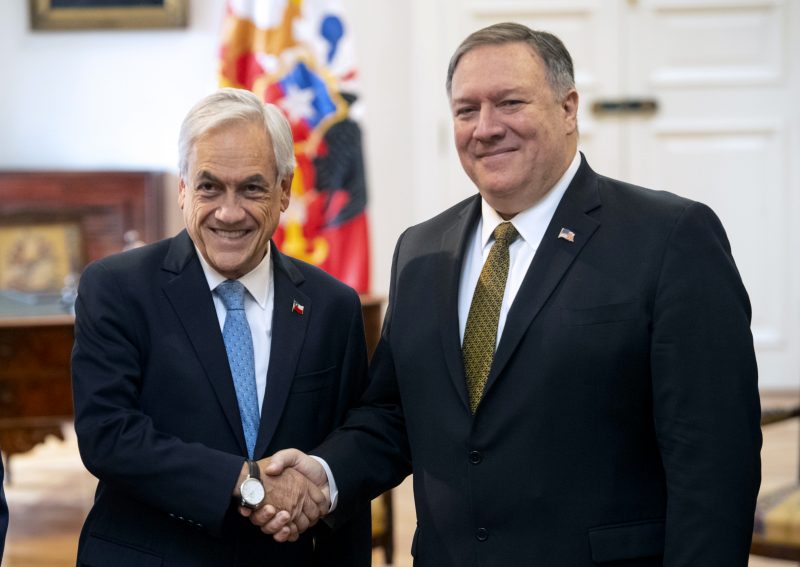Venezuela, China loom large as Pompeo begin LatAm tour in Chile
Chilean President Sebastian Pinera shakes hands with US Secretary of State Mike Pompeo (R) at La Moneda Presidential palace in Santiago, April 12, 2019 (Martin BERNETTI)
Santiago (AFP) – US Secretary of State Mike Pompeo began a four-nation tour of Latin American allies in Chile on Friday, holding talks with President Sebastian Pinera that focused on Venezuela and the growing commercial influence of China.
Pompeo met with Pinera and his Foreign Minister Roberto Ampuero at the La Moneda presidential palace in Santiago after arriving in the early hours.
Pompeo thanked Chile “for being a true leader for the Venezuelan people” in taking in around 300,000 refugees fleeing President Nicolas Maduro’s embattled socialist regime.
“I want also to applaud President Pinera for helping isolate Maduro and for showing compassion towards innocent people fleeing the economic and humanitarian crisis in their home country,” Pompeo said in a speech.
Pinera reiterated Chile’s position that change in Caracas must occur “in a democratic and peaceful way, discarding a military intervention.”
The US has repeatedly warned Maduro that “all options” remain on the table to bring about a resolution to the crisis. Maduro has blasted this statement as a clear threat of military intervention.
The highlight of Pompeo’s trip will be a brief visit Sunday to the Colombian city of Cucuta on the Venezuelan border, where he will meet refugees, after trips to Paraguay and Peru. All four countries are led by right wing or center-right leaders favorable to Washington’s uncompromising approach to Maduro.
– China influence –
Pompeo’s visit is partly aimed at blunting trade rival China’s growing reach in Latin America, where Beijing is Chile’s biggest trading partner, representing 30 percent of Santiago’s exports — mainly raw materials such as copper and agricultural products.
By comparison, the US accounts for only 14 percent of Santiago’s exports.
The US official said before landing in Chile that the current US administration had “spent a lot of time” in Latin America seeking to improve trade in a region which has turned its back in recent years on a slew of leftist governments.
“This is an historic opportunity,” he told reporters, referring to “a handful of countries that are truly market driven, democratic in ways that we haven’t had in South America for decades. And we think it creates real opportunity.”
Asked about China’s influence at a press conference following a working lunch with his Chilean counterpart, Pompeo said: “I think the Chilean government and the United States government both share the same concerns.”
“China’s trade activities often are deeply connected to their national security mission, their technological goals, their desire to steal intellectual property, to have forced technology transfer, to engage in activity that is not economic,” he said.
“And one of the things we talked about is how we could share information together so that we would know which was which, so that each country could protect its own citizens, so that each country could stay away from occasions where China was acting in malign or nefarious ways while still understanding that trade between our countries is important.”
– US concerns –
Of concern to the US is Chile’s contracts with Huawei, the Chinese tech giant which Washington has long considered a security threat. It has already severely restricted the Shenzhen-based company’s presence in the United States, suspecting its products could be used to spy on Western governments.
While making no direct reference to Huawei, Pompeo said: “Fair, free and open trade is fine.”
But he added: “It is not okay to put technology systems in with latent capability to take information from citizens of Chile or any other country and transfer it back to President Xi’s government.
“Those are the conversations that we had today, and I am confident we have a full understanding of both the risks and the opportunities associated with China.”
Disclaimer: Validity of the above story is for 7 Days from original date of publishing. Source: AFP.


